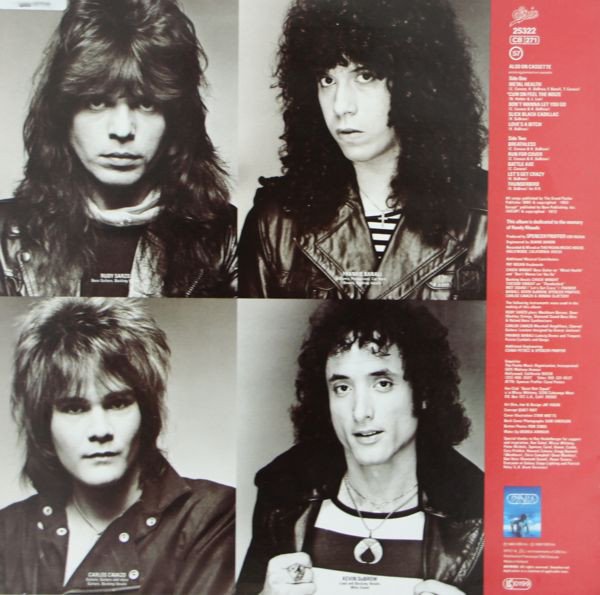QUIET RIOT - METAL HEALTH: A Standard-Bearer For The Headbangers
R.I.P., Frankie Banali. He was a well-traveled drummer in the hard rock scene, doing professional work in both live and studio settings for a variety of groups, but his biggest claim to fame was his work asthe drummer for Quiet Riot. That group was at the vanguard of the early '80shard rock scene that defined mainstream rock until the rise of grunge in the early '90s. Their time on top would be short but they produced the scene's first #1 album with Metal Health.With over ten million copies sold, it remains a standard-bearer of its era.
The first side of Metal Health opens with a one-two punch that assured the group's place in the record books. The title track became the group's anthem, a tribute to the idea of defying societal norms to rock at all times. It shows off two key elements of the band: the overdriven persona of lead singer Kevin DuBrow, which would beboth a blessing and a curse for the band, and the formidable chops of the players. The rhythm section lays down a throbbing, at times atmospheric grooveand guitarist Carlos Cavazo riffs and wails in all the appropriate places. Add in a gang-shout chorus built on the exhortation "bang your head" and you had a song that was a rallying cry for budding heavy rockers everywhere.
The follow-up track was something the band didn't care for and was only recorded at the insistence of producer Spencer Proffer. The band even tried to sabotage the effort by failing to rehearse the song before recording.That said, the group's skills betrayed their indifference towards thematerial... and that's how a tossed-off cover of an old Slade song became the'80s metal anthem "Cum On Feel The Noize." Banali's up-front drumming, twinned with a thrumming Rudy Sarzo bassline, gives it a distinctly '80s sense of hard rock propulsion and Cavazo's solos are show-offy in a good way, fast and noisy yet melodic and well-crafted. DuBrow's life-of-the-party vocal attack tops it off. It was a top-five hit on the Billboard charts and remains a crucial part of any respectable '80s pop metal playlist.
The remainder of side one hits a series of marks you would expect from an early '80s hard rock L.P.: "Don't Wanna Let You Go" is a mid-tempo cruiser that allows the listener to catch their breath after the first two songs. It's an effective, surprisingly subtle piece of work. "Slick Black Cadillac" is a reworking of a track from the band's early days when Randy Rhoads was a member: it's a fun little pop-metal highball about the joys of driving a nice car fast. "Love's A Bitch" closes things out on an ominous note, serving up a pounder with a snarling sing-along chorus and some effective acoustic textures in its first half.
The second side bounds out of the gate at 100 mph with its first two songs: "Breathless" races at a quick gallop with itsriffs soaring over the top, sounding like a distant cousin of U.F.O.'s"Light Out," and "Run For Cover" cranks up the speed even faster to create a bit of proto-speed metal offset by a bubblegummy sing-along chorus. "Battle Axe" is an obligatory guitar solo piece that nods inEdward Van Halen's direction with its guitar-center theatrics before leading into "Let's Get Crazy," another stomper that leans on power chords toback up a set of lyrics that would make Gene Simmons blush ("wanna kiss your lips, not the ones onyour face").
The closer is the second side's best track, a powerballad that bypasses romantic themes to offer a heartfelt tribute to the gone-too-soon Rhodes. "Thunderbird" has got all you want from thisstyle: sentimental piano shadings, gentle verses that build to an anthemicchorus, emotive guitar breaks, a bit of synth layering for the fade out. It's the only time on the album that DuBrow's vocals are subtle... and he's quite good.
Metal Health was a massive hit for Quiet Riot but the group would implode in slow motion over the next few years. DuBrow got in trouble with fansand fellow musicians alike for being abrasive and hyper-opinionated in interviews while the band's next three albums showed a creative decline: Condition Critical was practically a track-for-track Metal Health clone, including another Slade cover-as-single, QR III was an ill-advised detour into high-tech AOR and the self-titled 1988 album dispensed with DuBrow entirely for a new singer and a quasi-Whitesnake vibe. None of them worked and the band disbanded before the decade was out.
However, Quiet Riot would soon reunite when the '90s rolled around, with Banali being a constant as both drummer and manager to the very end. Metal Health was the cornerstone that kept this multi-decade enterprise aloft and remains a key highlight of the '80s commercial hard rock renaissance. Thirty-plus years later, its party-hearty vibe retains its charm and the combination of sturdy, no-frills tunes and the band's precise chops sticks to the ribs. In an era that is both post-rock and post-record business, the nostalgia inspired by this kind of good-time material gets deeper with each year.





